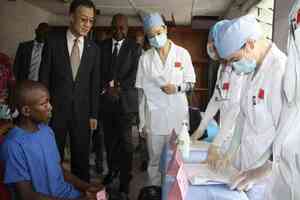The African Centre for Disease Control headquarters are located in a southern nearby of Addis Abeba, Ethiopia, and was founded and funded by China as part of their medical diplomacy with Africa.
The building houses administration offices, an emergency operations centre, a biological laboratory, a resource centre, conference rooms, and offices, all of which were erected, furnished, and equipped as a gift for the continent by the Chinese government.
The Africa Centres for Disease Control and preventive (CDC) headquarters, inaugurated in January by Chinese Foreign Minister Qin Gang, is meant to boost Africa’s epidemic response, as well as disease preventive and surveillance capabilities.
The gift is part of the Chinese plan to strengthen its medical diplomacy with African countries as it tries to position itself as a significant player in the global health business.
Beijing continues to send hundreds of medical experts to African countries each year, as well as financial resources, to combat infectious diseases. In addition to supplying the Africa CDC, China has created other healthcare infrastructure all through the continent.
According to observers, China intends to challenge the US’s supremacy in global healthcare, notably in Africa, where the US has financed multibillion-dollar malaria and HIV/AIDS projects.
Lina Benabdallah, a China-Africa a scholar at Wake Forest University and a visiting fellow at Harvard University’s Centre for African Studies, believes China’s medical diplomacy has enriched people-to-people a connection in a beneficial way.
China expanded to include medical supply and equipment donations, clinic and hospital development, and training programmes, he said.
According to Shinn, China’s priority in the early half of the twenty-first century was on providing basic health staff, before growing to include the building of hospitals and, most recently, countering infectious illnesses.
“In recent years, China has prioritised the treatment and eradication of infectious diseases like malaria, Ebola, and Covid-19.””
Hinn said China had focused explicitly on malaria, building antimalarial treatment centres, providing artemisinin combination medicines, and attending training workshops.
Based on a study conducted by academics at AidData, a research lab at the College of William & Mary in Virginia, China delivered 1,026 health projects worth $1.6 billion across 51 African countries.
The scale and depth of China-Africa cooperation has risen in light of the success of the malaria elimination effort. Funding for the epidemic is growing, with Chinese funding help for 30 health facilities aimed at improving Africa’s response.
“China’s active participation and significant funding for Ebola-related prevention and care indicate the country’s growing role as a global health leader.”
During the Covid-19 outbreak, China continued to support Africa, with President Xi Jinping promising a billion doses of vaccine for the region.
According to Shinn of George Washington University, reducing infectious disease in Africa is in China’s best interests “because this is one of the primary concerns of the growing number of Chinese – at least prior to Covid-19 – living and working on the continent.”

